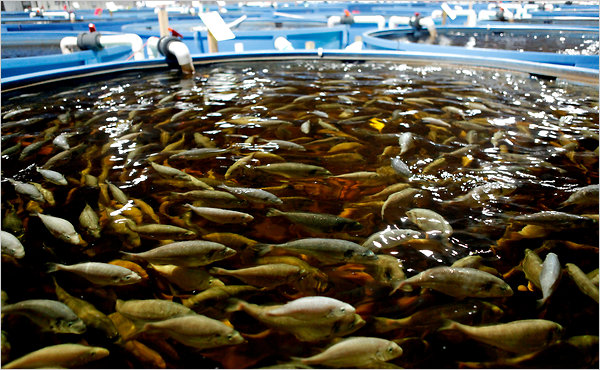
Farm Raised Fish:
Healthy or Horrible?
Fish farms have been around for centuries, from the Amazon Basin to Chinese carp, it is a practice that has been in place in many cultures to provide an abundance of healthy seafood to natives. Today, fish farms have a new level of production and structure that begs the question: is it healthy and safe to eat? There are pros and cons to consuming farm raised fish that must be understood before making an educated, well-informed decision.
Fish Farms of Today
You can find just about any type of fish or crustacean in farms all around the world. From salmon to shrimp, oysters to tilapia, it is no surprise that 50% the world’s seafood supply comes from farming. So many species are being over-fished that the populations are dropping rapidly. The demand for seafood is at an all time high, as the world population continues to grow. Farming is one solution to the world hunger issues because anywhere there is water, you can have a fish farm.
Well, almost anywhere. The growing concern many critics have of fish farming is the detriment to the fish and the environment. Fish are kept in overpopulated enclosures, often swimming in waste, dead fish and other unsavory elements. In China, they are dealing with water pollution that includes sewage and industrial run-off which is also affecting the fish farms. Often fish are treated with veterinary medicines for infections or other health issues, which again begs the question: are farmed fish safe to eat?
The Good News
Farming practices are slowly improving and there are stricter standards in supermarkets as to the quality of fish sold. While farming fish has been around for centuries, the environmental impacts as well as the health repercussions were not a factor when the world population was a fraction of what it is today.
Fish is a necessary food for a healthy diet, loaded with omega-3 fatty acids that help cardiovascular health and full of protein needed for energy. Not all fish are equal though, for example swordfish have less omega-3s in them than the smaller sized salmon. Also, shellfish contain excellent amounts of selenium and omega-3s which are also a delicious meal choice. The smaller fish and shellfish are better choices and if your decision is either farm raised or no seafood, make the wise choice.
The best decision you can make is to eat a balanced diet with plenty of vitamins, protein and other nutrients the body needs to not only survive but to thrive. This includes seafood at least twice a week, so however you can purchase it, make it a habit for you and your family.
by LA DiNardi



Follow Us!